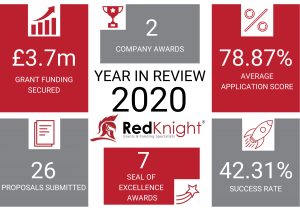Reflecting on Horizon 2020: why we’re glad the UK will participate in Horizon Europe
 On 24th December, the UK Government announced that it had reached a post-Brexit agreement with the EU, following months of negotiations. Since then, we have learnt that the UK will have ‘Associated Country’ status in Horizon Europe, the EU’s €95.5 billion programme for research and innovation. This means that the UK will participate fully in the new programme.
On 24th December, the UK Government announced that it had reached a post-Brexit agreement with the EU, following months of negotiations. Since then, we have learnt that the UK will have ‘Associated Country’ status in Horizon Europe, the EU’s €95.5 billion programme for research and innovation. This means that the UK will participate fully in the new programme.
The UK’s participation is subject to a financial contribution from the UK Government to the EU budget, leading many to question whether association to Horizon Europe is worth it. To answer this pressing question, we have reflected on the UK’s performance in Horizon 2020, the 7-year programme that preceded Horizon Europe. You can read our key findings below:
The UK has a strong track record
- The UK received more than €7 billion of Horizon 2020 funding. This is equivalent to just over 12% of the programme’s total budget. Only Germany was more successful. However, Germany funded a higher percentage of the overall EU budget, contributing 20.9% compared to the UK’s 20.9%.
- In total, 16,123 British organisations were involved in Horizon 2020 projects. This includes 2829 SMEs, who received a total of €924.4 million. The success rate for UK organisations was 14.77%, much higher than the EU average of 11.9%.
- The UK received the highest number of grants from the European Research Council. Around 1/5 of grants were awarded to researchers at UK institutions. The University of Oxford, University of Cambridge, and University College London all feature in the top ten most successful research units.
Associated countries performed well in Horizon 2020
So well, in fact, that some associated countries outperformed their EU counterparts. For example, Switzerland secured €2 billion from the programme, outperforming countries including Austria, Greece and Ireland. It also received a larger number of ERC grants than some much larger EU countries, including Italy and Spain. Therefore, it is clear that Associated Country status was not a barrier to success.
The numbers show that UK businesses and researchers performed extremely well in Horizon 2020. In particular, it is impressive that UK SMEs received more than €900 million from the programme! This is a great source of funding for all involved in UK research and innovation and we look forward to seeing the opportunities that arise from Horizon Europe.
If you have any questions about Horizon Europe, please get in touch. Alternatively, subscribe to our free monthly newsletter to receive the latest news and opportunities direct to your inbox.
Sources: Horizon 2020 Country Profile, Nature and Wellcome Trust.
An Update on European Funding
 On the 24th December, the UK Government announced that it had reached an agreement with the EU, following months of negotiations. The deal has important implications for European funding opportunities and will affect those involved in UK Research and Development. We have summarised the key things that you need to know below:
On the 24th December, the UK Government announced that it had reached an agreement with the EU, following months of negotiations. The deal has important implications for European funding opportunities and will affect those involved in UK Research and Development. We have summarised the key things that you need to know below:
1. Continued participation in Horizon Europe
Firstly, the UK will continue to participate in a number of EU programmes for the period 2021-2027. This includes Horizon Europe – the EU’s €95.5 billion framework for research and innovation, for which it will have Associated Country status. This is subject to a financial contribution from the UK to the EU budget.
2. The end of Erasmus+
The UK Government has decided not to participate in the Erasmus exchange programme due to the cost of continued membership. It will be replaced with a £100 million national scheme, known as Turing, after the mathematician Alan Turing. This will start in September 2021.
3. The EIC Accelerator - what we know so far
We have received confirmation that UK businesses will remain eligible to apply for grant funding from the EIC Accelerator. However, they will no longer be able to participate in the European Innovation Council Fund, the part of the EIC Accelerator that provides investment through equity or other repayable forms.
4. Eureka Eurostars - continued opportunities for transnational innovation
The UK’s departure from the EU does not affect participation in the Eureka programme and its various funding streams. Therefore, it offers a continued source of European funding opportunities for UK SMEs that engage in transnational innovation. The next competition has a deadline of the 4th February, which you can find more information on here.
5. Freedom of movement ends - implications for researchers
Due to restrictions placed on freedom of movement, UK researchers will require visas for stays of over 90 days in the EU.
The deal answers some pertinent questions surrounding the future of UK participation in EU funding streams. Overall, we are pleased that a deal was reached and that the UK will participate in Horizon Europe. We will keep you updated on any further developments in the coming months, but if you have any questions, please do not hesitate to get in touch.
Funding Available for Projects on Quantum Technologies
 A new Innovate UK competition aims to advance the commercialisation of quantum technologies in the UK. From Monday 18th January, UK registered businesses can apply for a share of £7 million for feasibility studies or market research projects. This competition is funded through the Quantum Commercialisation programme of the Industrial Strategy Challenge Fund (ISCF).
A new Innovate UK competition aims to advance the commercialisation of quantum technologies in the UK. From Monday 18th January, UK registered businesses can apply for a share of £7 million for feasibility studies or market research projects. This competition is funded through the Quantum Commercialisation programme of the Industrial Strategy Challenge Fund (ISCF).
Scope
In this competition, all proposals must identify a clear market opportunity and an innovative project which exploits it. While Innovate UK plans to fund a portfolio of projects across a variety of technologies, all projects must:
- Study a commercial opportunity
- Quantify performance objectives
- Provide a roadmap of future exploitation
- Exploit second-generation quantum technologies
- Address at least one of the following: connectivity, situational awareness, or computing.
Specific Themes
In addition, there are a number of specific themes that your project can focus on, as listed below:
- Involve consortia that span the supply chain of component suppliers, system integrators, and end user businesses
- Focus on maximising UK return from the quantum technology research undertaken by the UK academic base
- Bring significant new investment and businesses into the UK’s growing quantum technologies sector
- Develop the quantum computing industry sector (hardware, components, simulators, algorithms and software) in the UK.
Eligibility
Projects must have total eligible costs of up to £500,000 for feasibility studies or £50,000 for market research projects. They should last between 12 and 18 months, starting by February 1st 2022 and ending by 31st July 2023. Projects can be single or collaborative but must involve an SME. Furthermore, the lead organisation must:
- Be a UK registered business of any size
- Involve an SME
- Carry out its project work in the UK
- Intend to exploit the project’s results from or in the UK
You can find more information regarding eligibility, scope, and how to apply on the Innovate UK competition page. Alternatively, if you have any questions, or would like to discuss a potential project with one of our expert bid writers, please get in touch.
Not the opportunity you're looking for? Subscribe to our free monthly newsletter to receive more grant funding competitions direct to your inbox.
£8 million available to improve the UK’s foundation industries
 Innovate UK is investing up to £8 million in large collaborative research and development projects to improve the UK’s foundation industries. Relevant industries include cement, paper, glass, ceramics, metals, and chemicals. This competition’s funding is from the Industrial Strategy Challenge Fund, which you can find more information on here.
Innovate UK is investing up to £8 million in large collaborative research and development projects to improve the UK’s foundation industries. Relevant industries include cement, paper, glass, ceramics, metals, and chemicals. This competition’s funding is from the Industrial Strategy Challenge Fund, which you can find more information on here.
Scope
In this competition, foundation industry sector businesses should work with their immediate supply chain and equipment providers to solve common resource and energy efficiency challenges. The aim is to increase the productivity and competitiveness of the UK’s foundation industries.
All projects will further develop technologies to reduce deployment risk and accelerate take-up across industries. In addition, the new technologies should create a step-change in resource or energy efficiency in these industries. More specifically, your project must address one or more of the specific themes listed by Innovate UK. For example, it may focus on heat recovery and utilisation, sensors and digitalisation, or waste utilisation.
Eligibility
All projects must have total eligible costs between £1 million and £2 million. They should start by 1st September 2021 and last between 12 and 24 months. This competition is aimed at those working in collaboration. The lead organisation does not have to be from the foundation industries; however, it is essential that the consortia include at least 2 businesses, from at least 2 foundation industry sectors. All organisations within the consortia must also fulfill the following criteria:
- be a UK registered business of any size or a research and technology organisation (RTO)
- carry out its project work in the UK
- intend to exploit the results from or in the UK
You can find more information on the Innovate UK website. If you have any further questions or would like to discuss an application with one of our advisers, please contact us today.
Looking for an alternative opportunity? Subscribe to our free monthly newsletter to receive the latest grant funding news and competitions direct to your inbox.
Innovation Fund: First call for small-scale projects
 The Innovation Fund, a new European funding stream, has launched its first call for small-scale, clean-tech projects. It has €100 million available and is also offering project development assistance for up to 20 rejected proposals. In line with the Innovation Fund’s wider objectives, the call aims to advance Europe’s transition towards climate neutrality.
The Innovation Fund, a new European funding stream, has launched its first call for small-scale, clean-tech projects. It has €100 million available and is also offering project development assistance for up to 20 rejected proposals. In line with the Innovation Fund’s wider objectives, the call aims to advance Europe’s transition towards climate neutrality.
Eligibility
The competition is open to projects with total capital costs between €2.5 and €7.5 million. Grants will cover 60% of a project’s total expenditure. The evaluators will consider the following award criteria: greenhouse gas emission avoidance, degree of innovation, project maturity, scalability, and cost-efficiency.
All projects should take place within an EU Member State, the only exceptions being Norway and Iceland. This has important implications for UK applicants; any project located in the UK will only be eligible for funding if the EU and UK reach an agreement.
Scope
Grants are available for innovative small-scale projects that are ready for market. For example, eligible projects may focus on making the first sale of new technology to pioneer customers. There are several eligible sectors within which your project can fall: renewables, energy-intensive, industries and substitute products, carbon capture and storage, energy storage. However, the call specifically encourages three key activities: products that substitute carbon-intensive ones, net carbon removal innovations, and direct air capture.
To be eligible for project development assistance, rejected proposals must meet the minimum requirements under the degree of innovation and greenhouse gas emissions criteria, and obtain at least half of the points available for project maturity. Additionally, the evaluators must believe project development assistance will help improve a project’s maturity.
For more information on the small-scale project call, visit the European Commission website. Alternatively, please contact us if you have any questions or would like to arrange a consultation. Subscribe to our free monthly newsletter to receive grant funding news direct to your inbox.
Innovate UK launches two new SBRI competitions
 Innovate UK has announced two new Small Business Research Initiative (SBRI) competitions. The first competition aims to improve hip fracture outcomes while the second aspires to improve multimorbidity acute care.
Innovate UK has announced two new Small Business Research Initiative (SBRI) competitions. The first competition aims to improve hip fracture outcomes while the second aspires to improve multimorbidity acute care.
The SBRI Programme
The SBRI programme provides innovative solutions to challenges faced by the public sector, in order to improve efficiency and effectiveness. The scheme is open to all organisations that can demonstrate a route to market for their solution. However, it is best suited to SMEs.
SBRI: Improving Multimorbidity Acute Care Using Data Analytics, phase 1
Phase 1 will open from 4th January to 3rd March 2021. In this competition, organisations can apply for a share of £160,000 to develop a data-driven solution that improves the care and outcomes for A&E patients with multimorbidity. The solution must:
- Identify multimorbidity patients
- Provide individual risk stratification through real-time data visualisation
- Provide decision support following an emergency admission.
Phase 1 projects can have total costs of up to £10,000, inclusive of VAT. They should start by 5th May 2021 and last up to 3 months. Contracts will only be awarded to single legal entities, but subcontractors are allowed. A decision to proceed with Phase 2 will depend on outcomes from Phase 1. For more information on eligibility and scope, and details on how to apply, visit Innovate UK.
SBRI: Improving Hip Fracture Outcomes Using Data, phase 1
Phase 1 will open from 1st February 2021 to 31st March 2021. In this phase, organisations can apply for a share of £160,000 to develop a solution that will improve the quality of care and outcomes for hip fracture patients. The solution should use routinely collected health data and data analytics techniques.
Phase 1 projects can have total costs of up to £15,000 and projects should last for up to 3 months. Funding is only available for single legal entities however the competition does allow subcontractors. Again, this is Phase 1 of a potential 2-phase competition; a decision to proceed with Phase 2 will depend on the outcomes from this phase. You can find more information here.
If you have any questions about either of the opportunities above, please get in touch. In addition, you can sign up for our free monthly newsletter to receive grant funding opportunities direct to your inbox.
Automotive Transformation Fund has £7 million available
The Automotive Transformation Fund (ATF) supports the industrialisation of a high-value electrified automotive supply chain in order to accelerate the development of net-zero emission vehicles. It is run by the Advanced Propulsion Centre and its partners: Innovate UK, the Department for Business, Energy and Industrial Strategy, and the Department for International Trade.
Scope
This competition invites UK registered organisations to apply for a share of £7 million for relevant economic or technical feasibility studies. The APC is looking for projects that are one of the following:
- Firstly, economic feasibility studies that consider the development of large-scale manufacturing facilities; they should take up to 6 months to complete.
- Secondly, technical feasibility studies that focus on developing advanced manufacturing processes or scaling up product manufacturing. These must take up to 12 months to complete.
Projects must support the UK automotive industry by making it easier for investment to happen in large scale manufacturing, or by building electrified vehicle supply chains. More specifically, projects should focus on one or more of the following products: batteries, motors and drives, power electronics, fuel cell, or recycling any of the above. Alternatively, you can work on the materials and components that go into the product.
Eligibility
All projects must have total eligible costs of under £1 million. Applicants can work in collaboration or employ subcontractors but subcontractors should be based in the UK.
To lead a project or work alone, your organisation must:
- Be a UK registered business of any size, a research organisation, or a research and technology organisation
- Be a grant recipient
- Carry out its project work in the UK and intend to exploit its results from or in the UK.
Interested in applying for funding from the Automotive Transformation Fund? You can find more information here. Additionally, you can contact us to arrange a free consultation.
Subscribe to our free monthly newsletter to receive alternative opportunities direct to your inbox.
The Future of Grant Funding: What to Expect in 2021
 It's time to look towards the future of grant funding, considering what we can expect in 2021. As the end of the year draws closer, so too does the UK’s withdrawal from the European Union. We are currently unsure of what exactly this means for European funding. However, we are hopeful that the UK will continue to be eligible for EU funding streams, including the EU’s new research and innovation framework – Horizon Europe. Keep an eye on our blog and social media channels for updates in the coming weeks.
It's time to look towards the future of grant funding, considering what we can expect in 2021. As the end of the year draws closer, so too does the UK’s withdrawal from the European Union. We are currently unsure of what exactly this means for European funding. However, we are hopeful that the UK will continue to be eligible for EU funding streams, including the EU’s new research and innovation framework – Horizon Europe. Keep an eye on our blog and social media channels for updates in the coming weeks.
National Funding
Government investment in R&D funding has increased, with the Chancellor announcing a £15 billion boost in the 2020 Spending Review. This aligns with the Government’s goal to increase public R&D investment to £22 billion per year by 2024 to 2025. There will continue to be opportunities to apply to national funding schemes in the UK, including Innovate UK. Innovate UK runs regular competitions covering the following sectors: emerging and enabling technologies, infrastructure systems, health and life sciences, and manufacturing and materials. There are also regional funding opportunities, from bodies including SMART Cymru (for Wales-based organisations).
International Opportunities
Additionally, there will also be opportunities for international collaboration on R&D projects. We expect that the UK will remain a Eureka member nation, meaning that UK organisations will still be able to apply to Eureka Eurostars. Eureka Eurostars provides funding for transnational innovation projects conducted by research-performing small and medium enterprises. You can find more information here. It is also likely that there will be further opportunities to collaborate with countries outside the EU, including the US and Canada.
If you have any questions, please contact us. For more information on the future of grant funding, as well as current opportunities, subscribe to our free monthly newsletter.
2020: A Year in Review
2020 – well, where do we begin? It’s been an eventful year for RedKnight and all of our clients, with the Covid-19 pandemic bringing challenges that none of us could have foreseen. We’ve spent the best part of the year working from home, more committed than ever to making innovation funding easier for start-ups and SMEs. It’s fair to say we lost count of all the Zoom meetings a long time ago!
Projects
While the year has had its challenges, it’s also brought highpoints that we as a business are extremely proud of. We've supported projects from a range of sectors, from digital health to advanced materials. In particular, we were proud to support the innovative medtech start-up, GeneFirst, with a successful application to Horizon 2020’s Innovative Medicine Initiative, winning €2.8 million. The competition was extremely competitive; of 144 applications, just 8 projects received funding. An impressive feat, considering RedKnight had just 14 days to develop and write the 70-page application! To read more about GeneFirst’s Rapid-Covid project, and the other successful projects we’ve supported this year, visit our website.
2020 in Numbers

It's been another busy year of bid writing, with 26 proposals submitted at the time of writing. We are proud to have secured a further £3.7 million in grant funding, bringing our total to almost £10 million! Our average application score now stands at 78%, with a success rate of over 42%.
Overall, 2020 has been a great year for RedKnight, and we look forward to taking on new challenges in 2021. We’d like to take the opportunity to say a huge thank you to all of our clients, both new and old, who’ve trusted us to support their proposals. We look forward to following your projects in 2021 and working with you again in the future!
Looking for grant funding in 2021? Subscribe to our free monthly newsletter to receive the latest opportunities direct to your inbox.
The Innovation Fund: €10 Billion Available for Low-Carbon Technology Projects
 Background
Background
The EU Innovation Fund is one of the world’s largest funding programmes for low-carbon technology projects. It will provide around €10 billion of support between 2020 and 2030, supporting Europe's transition to net-zero. By helping businesses invest in clean energy and industry, the Innovation Fund will boost economic growth, create local future-proof jobs, and reinforce European technological leadership on a global scale.
First announced in 2019 and funded by the EU Emissions Trading System, the fund launched its first competition in July 2020. It replaced the Ner300 programme and holds numerous advantages over its predecessor; it improves the risk-sharing for projects by giving more funding in a more flexible way. Not only this, but it has a simpler selection process and is also open to projects from energy-intensive industries.
Scope
Funding is available for both large and small-scale projects. In general, eligible projects will focus on one of the following themes:
- Innovative low-carbon technologies and processes in energy-intensive industries
- Carbon capture and utilisation
- Construction and operation of carbon capture and storage
- Innovative renewable energy generation
- Energy storage
Application Process
For large-scale projects, there is a two-stage application process. Firstly, there is an expression of interest stage, judging project effectiveness, degree of innovation, and project maturity. Then, the second stage is a full application; it considers all the same criteria, as well as scalability and cost-efficiency. In contrast, small-scale calls have just one stage, this being the full application. The Innovation Fund will support up to 60% of the additional capital and operational costs of large-scale projects and up to 60% of the capital costs of small-scale projects.
The first call for small-scale projects is now open and will close on 10th March 2021. For more information, visit the European Commission website. Alternatively, please contact us if you have any questions or would like to arrange a free consultation.
We are unsure whether UK organisations will be able to participate in EU funding streams following Brexit. Sign up for our free monthly newsletter for the latest updates, as well as alternative grant funding opportunities.
Source: European Commission
